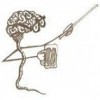Paranoia or reality? How do you tell the difference?
As a sufferer of emotional baggage, thats so deep it's threatening my arraige. It's time to do some soul searching. It's time to ask some questions. How do you stop the bad thinking patterns?
i used to suffer from panic disorder when i was 21 or so. since i hate any medication whatsoever, as i don't like having my wits compromised to any degree, i decided to practice meditation and deep breathing. that helped, but i still had severe panic attacks from time to time and began dreading the next one. meditation, research and counseling made me realize i had a script playing in my subconscious with negative thoughts in them. i didn't even realize i was doing that so started to pay attention and sure enough, negative thoughts would pop into my head, mostly 'what if' scenarios, so i began visualizing a big red STOP sign in my mind's eye when a negative thought would surface, and began focusing on something positive. the more you do this, the more it becomes a habit and you free yourself from negative habit patterns and adopt positive habit patterns. anxiety and negative thinking will always be there in the back of the minds of those who suffer from them but is how you handle it that matters. we can talk ourselves into some pretty uncomfortable spots, but if we have that power, then we have the power to talk ourselves out of them too.
Hi, cosette, thanks for the description how you escaped the trap of negative thinking. Good to read it from someonw who experienced it first-hand and overcame it.
Both the original question of Paranoia or reality? How do you tell the difference? and the question of "How to stop bad thinking patterns" has the same answer.
You need to de-stress first of all.
Where I come from, all the thoughts and ideas that flow out of a highly stressed state aren't counted. We call these highly stressed states "magic failure" because you lose the plot and start thinking all this weird stuff, and none of it is "real" - it's just stress nonsense, and the worse the stress gets, the worse the nonsense becomes.
And there's a point where it turns into paranoia.
There are lots of different ways to de-stress, and when the weird thoughts start up, that is exactly the sign that something needs to be done to bring stress down - wash your hair, go for a walk, eat something, look at pictures of something you love, listen to meditation music, whatever you know works for you to help release stress.
It's the stress that's the enemy - the thoughts are only the side effect!
From one of my illustrious hubs… (for what it’s worth…)
…“Negative thoughts all the time? Each time you become self-aware of a negative thought, just consciously think one or more of the following: “so what”, “dead issue”, "ignore it", "forget it", "stop it", "shut up", "I've resolved that", "give it a rest", "go away", "learn (learned) from it", "this will pass", "get over it", “let it go”, “let it be”, “move on”; and then change the subject. In time, the practice becomes automatic. After awhile, your subconscious will quit serving up so many of these kinds of thoughts to you.”…If you know in your more lucid moments that you are prone to paranoid thoughts running off with you, work on developing the reflex of "disregarding yourself."
If you've already proven to yourself that you slant things negatively, use that knowledge for positive. So, when you start to "discover" some new "piece of evidence" or even just a feeling that things are going wrong, TRUST that you are being paranoid and forget it.
It's perfectly okay to have self-talk with yourself that goes something like, "Self, I know that this feels like it's really messed up, but, I also know I ALWAYS do this to me, so, you know what, I'm not going to do it this time." Then start "ignoring" those negative thoughts until they stop. I know this works from personal experience. Hope it helps.I also have trouble with negative thinking. I made a hub about positive affirmations which may be helpful to you as it has been for me:
http://hubpages.com/hub/A-Daily-Dose-of … firmationsI'm not an expert, but I learned that there are things I can control and things I can't. I can't control what others think, do or feel, but I can control what I think do and feel. I try to focus on the positive things in my life, I try to treat others the way I want to be treated, and hopefully they will respond positively to me for that. Then whatever happens, happens and I must learn to accept that. This way there is no second guessing. You can make your self crazy think if you did this or that maybe you would have gotten a different reaction. Be consistent stick to your principles and let the chips fall where they may.
The fact that you're even thinking about soul-searching pretty much says you're not so paranoid that you're not willing to consider you may be thinking something that's incorrect.
What it also says, though, is that there's a chance you're doubting yourself when, maybe, you shouldn't be. Sometimes the problem for people who know they have "baggage" is that they aren't as confident in their own ability see what's what, reason things out for themselves, and generally not doubt themselves more than they ought to.
How to stop? Sorry to say I don't think I can help, other than to suggest seeing a counselor who might be able to offer you some tips and guidance (and an objective opinion about whether you have a healthy sense of self-doubt or whether you doubt yourself no matter how well reasoned your belief is, or how much evidence you have.
Other than that, I'd think that trying to step back and ask if what you're thinking is based on reason and evidence (or not) might be some help. If you have emotional baggage that comes in and colors what you think before you have a chance to reason things out and consider evidence, you may need to stop yourself and start with reason and evidence first. From there, if "all signs point to" (as the "Magic 8 Ball" has been known to say) x, trust, at least, that you're looking at reasoning and evidence. If you don't have enough information to reason, or don't have any evidence, maybe it would help to stop, decide to hold off on drawing conclusions, and see what happens.
If you know you're someone who jumps to the wrong conclusions "all the time" maybe a therapist could help. Sometimes, though, other people (sometimes without intending to) will "capitalize" (wrong word because they may not intend to do it at all) on your insecurities and fuel your feelings that you're the one who isn't thinking correctly.I've read and reread this book. "Loving What Is" by Byron Katie.
You don't have to believe all your thoughts. They are just thoughts. If you learn to question your thoughts by asking, "but do I absolutely know this is true?" then you begin to break up the insanity of endless suffering from thoughts that are neither correct, and often not real.
I struggled with this a long time myself. Question your thoughts and ask yourself if you absolutely know they are true. But also go to Byron Katie's website here and start reading. I think you'll find relief and help.
http://www.thework.com/index.phpChantwaun,
Just a follow-up.
It occurred to me last night that ”paranoia” is another word for “fear”.
There seems to be a medical consensus that one of the symptoms of vitamin B-1 deficiency is the fear emotion. Some folks say it’s a B-1 (thiamine) deficiency; others say it’s a B-complex deficiency.
Only you can decide if this information is relevant. You’ll have to research it.
Be nice if the stress can at least be reduced with a vitamin supplement or change in nutrition. Who knows…?Paranoia is a psychological designation that depends on the outcome of events. If I fear that someone is out to hurt me and it doesn't happen, then I was paranoid, but if it does happen, then I was intuitive! If I fear that I am being lied to and I'm not, it's paranoia, but if I am being lied to, then it's objective discernment! Fear thoughts can also manifest in our circumstances. I've found that if I try to hate certain fears away, that I can almost guarantee that they will manifest. Try hating the fear away of being stopped by police and see what happens! Right now I am going to try to hate the fear away of being a multibillionaire. I'll let you know how it's working!
My thoughts on how to control paranoia and to know the difference
You said you have alot of baggage? In dysfunctional families we often learn bad things. the trick is to recognize what was bad and avoid it, and surround yourself with healthier people.
You can learn alot from wise, older friends! They can really inspire you and uplift you!
When in a situation where you are not sure: stop, think, take a moment and ask yourself "Are they laughing at me or some joke"
There are coping skills and if you ever see a therapist you could learn more.
These are possible things that may happen. I hope this is helpful!Paranoia? Why do you ask? Do you think I'm paranoid? Why does everyone think I'm paranoid?

Related Discussions
- 17
How to get rid of negative thoughts.?
by maheshpatwal 12 years ago
How to get rid of negative thoughts.?Is there any way we can completely and permanently flush out the negativity from our lives?
- 7
Which is the best way to get rid of negative thinking??
by Shwetha Shetty 13 years ago
Which is the best way to get rid of negative thinking??
- 12
How do I stop over-thinking and negative thinking?
by saumya29 12 years ago
How do I stop over-thinking and negative thinking?
- 26
Positive thinking: Do YOU think that it can make your life better? Make you happ
by Kari 9 years ago
Positive thinking: Do YOU think that it can make your life better? Make you happier?I'm interested to know how you feel about positive thinking. I know some people think it works for a happier and healthier life while other people don't. I am a fan of positive thinking, but I want to know how my...
- 34
What are some awesome tips for staying positive?
by Earl S. Wynn 14 years ago
What are some awesome tips for staying positive?
- 34
What are your strategies for coping with negativity?
by Michelle Liew 12 years ago
What are your strategies for coping with negativity?


















